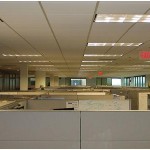I recently read a great blog post called The Myth of Efficiency. The premise is that for knowledge workers, trying to build more efficient work processes or implementing time saving “efficiencies” is not an effective way to boost productivity.
Here’s a (lengthy) excerpt that I especially liked:
The idea is that time has a monetary value (say, the per-hour employment costs of each employee), and if you save time, you save money. One example that LeBlanc mentions is moving printers. It seems to make sense on its face. You spend time walking to and from the printer. Therefore, printers should be located to minimize the total time people spend in transit, which could mean moving the printer closer to the heavy users of printing. Then those people can spend more time at their desks being productive.
But there is a serious fallacy in this argument: the assumption that the constraint on productivity is time at your desk. Let’s leave aside the issue of whether you are productive walking to the printer. The more serious issue is that you aren’t equally productive the whole time you sit at your desk. What if you spend your extra two minutes (in reduced time picking up printouts) at I Can Has Cheezburger?
Well, the efficiency expert may counter, all I need to assume is that a fixed percentage of your desk time is productive. But that’s still a big assumption. Maybe the real constraint on your daily productivity is mental energy, and you only have enough mental energy to do four hours of real work a day. Then your extra two minutes will all go to looking at pictures of cats with ungrammatical captions. Even more likely, maybe the real constraint is your internal sense of what a reasonable day’s work is.
With knowledge workers – those who work with information, ideas, numbers, words – the most important factor driving productivity is not the sheer amount of time spent at our desks. Work sometimes happens in surges and bursts. Great ideas sometimes materialize out of idleness. Breakthroughs happen when you step away from your desk and take a walk outside and return to the problem with fresh eyes.
The operations and systems of most knowledge work is already about as “efficient” as it’s going to get – we can send e-mail and get Google search results instantaneously. So we’re not really able to get much “faster” at how we do this kind of work.
The real question for knowledge workers – and their employers – is not, “are you doing things efficiently,” but “are you doing the right things?”
Increasingly this will be the only question that matters.



There’s something just plain wrong with the thinking here. As you say:
“the most important factor driving productivity is not the sheer amount of time spent at our desks.”
I’d go further. In some cases time spent walking down the corridor to the print room can be just as productive as time sitting at a desk. In fact, moving to different surroundings often stimulates the brain.
And should you happen to bump into a colleague in the printer room and have an informal conversation, you might get more done than in a hour of desktop. Of course, you might just as easily discuss something totally unconnected – for example the weekend’s football. But even this can help those cogs go around and stimulate thought.
I’m deeply concerned that any sensible manager thinks time-at-desk = productive time.
Thanks for reading, Bill.
I agree – there are so many components of productivity in the knowledge economy that have nothing to do with “desk time.” There are too many managers who still act as if they’re managing a factory. But in the knowledge economy, the workplace is not a factory, it’s a cafe.